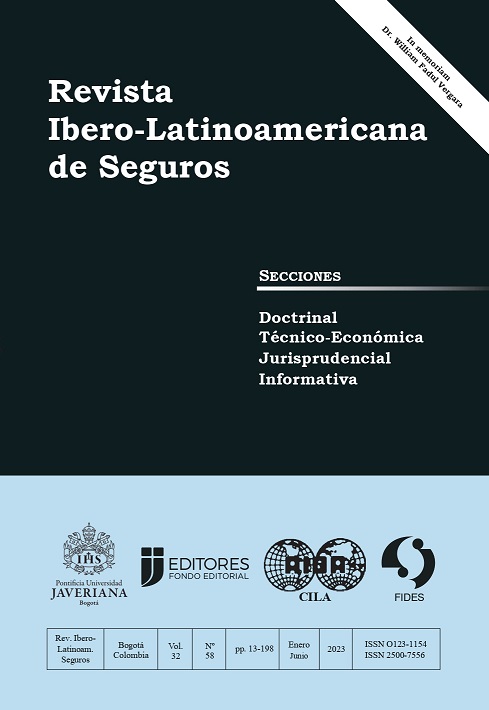Abstract
In this research, we seek to outline important assumptions to examine the proper legal treatment of the information presented by the insured, in favor of the efficiency of insurance contracts.
Starting from the examination of the main characteristics of insurance contracts, mutualism, actuarial calculations, its social function, we arrive at the importance of the information provided by the insured, for the adequate and balanced pricing of the service.
In this scenario, we seek to evaluate the consequences attributed by the Argentine and Brazilian legal systems, highlighting the positive points of each one and those that could suffer contributions.
BLOCH, Robert. Los seguros Del comercio exterior. Buenos Aires: Ad-hov, 2011;
CARLINI, Angélica; SARAIVA NETO, Pery (orgs.). Ano VII. Porto Alegre: Livraria do Advogado, 2022;
FIGUEIREDO, Sandra. Contabilidade de seguros. São Paulo: Atlas, 1997;
GARRONE, José Alberto; CASTRO SAMMARTINO, Mario E. Ley de seguros. Comentario y jurisprudencia, Buenos Aires: Abeledo-Perrot, 1998;
GHERSI, Carlos Alberto. Contrato de Seguro. Buenos Aires: Astrea, 2007;
LUCAS FILHO, Olivio. Seguros: fundamentos, formação de preço, provisões e funções biométricas. São Paulo: Atlas, 2011;
MARTINS, Fran. Contratos e obligações comerciais. 16ª ed. São Paulo: Forense, 2010;
PINDYCK, Robert; RUBINFELD, Daniel. Microeconomia. 5ª Ed. São Paulo: Person;Prentice Hall, 2005;
SHAFER, Hans-Bernd; OTTO, Claus. Manual de análisis económico Del Derecho Civil. Madrid: Tecnos, 1991;
STIGLITZ, Rubens S. Derecho de Seguros, Tomo I. 2ª Ed. Buenos Aires: Abeledo-perrot, 1998;
STORDEUR, Eduardo. Análisis Económico del Derecho. Buenos Aires: AbeledoPerrot, 2011;
TUHR, Andreas Von. Derecho Civil: teoria general del derecho civil aleman, vol II. Buenos Aires: Depalma, 1947.
This journal is registered under a Creative Commons Attribution 4.0 International Public License. Thus, this work may be reproduced, distributed, and publicly shared in digital format, as long as the names of the authors and Pontificia Universidad Javeriana are acknowledged. Others are allowed to quote, adapt, transform, auto-archive, republish, and create based on this material, for any purpose (even commercial ones), provided the authorship is duly acknowledged, a link to the original work is provided, and it is specified if changes have been made. Pontificia Universidad Javeriana does not hold the rights of published works and the authors are solely responsible for the contents of their works; they keep the moral, intellectual, privacy, and publicity rights.
Approving the intervention of the work (review, copy-editing, translation, layout) and the following outreach, are granted through an use license and not through an assignment of rights. This means the journal and Pontificia Universidad Javeriana cannot be held responsible for any ethical malpractice by the authors. As a consequence of the protection granted by the use license, the journal is not required to publish recantations or modify information already published, unless the errata stems from the editorial management process. Publishing contents in this journal does not generate royalties for contributors.


